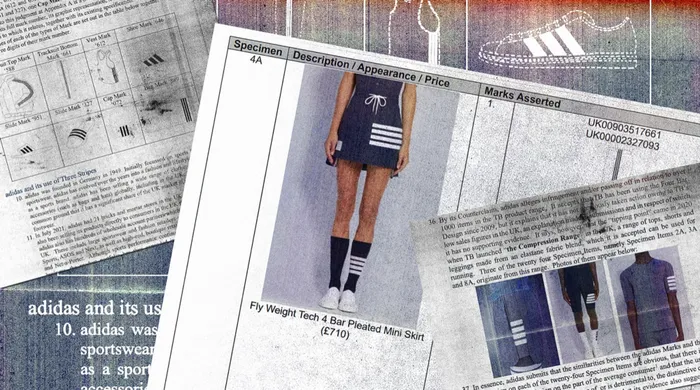
A U.K. judge has ruled that Adidas doesn’t own stripes. In a decision handed down last Friday, Justice Joanna Smith ruled in favor of luxury fashion brand Thom Browne in a suit originally brought by Adidas over the summer. The grounds for the sportswear behemoth’s legal action was the pattern and placement of Thom Browne’s four-bar stripe design, which Adidas claimed infringed on its trademark three-stripe motif.
“The average, reasonably observant consumer paying a moderate degree of attention will generally perceive the difference between three stripes and four,” Smith wrote in her final decision.
ADIDAS’S MARATHON ATTEMPT TO OWN STRIPES
This is only the latest installment in Adidas’s campaign to penalize Thom Browne for its four-stripe design, which has been an ongoing legal battle for several years in both the U.K. and the U.S. In May, the U.S. Court of Appeals for the 2nd Circuit upheld a 2023 jury verdict that the four-stripe design did not infringe on Adidas. Smith’s decision in the U.K. will ensure that Thom Browne’s products featuring the motif will not be pulled from the region’s market.
The decision could also mark a step forward for designers in general—especially those facing “trademark bullying,” a phenomenon that typically involves a larger company repeatedly bringing legal action against a smaller one who they claim is infringing on their trademarked designs.
While cases like these are certainly not without nuance, the crux of the problem is the imbalance of resources and power between the two parties, the lesser of which carries a greater burden to sustain a multiyear legal battle.
TRADEMARK BULLYING GETS A TIME-OUT
Apple is one example of a company often accused of trademark bullying for its repeated, sometimes overzealous oppositions against smaller companies with apple-based (or even pear and orange) logos.
In the activewear space, another offender is Nike, which recently lost an eight-year battle against a small business called Lontex. The Norristown, Pennsylvania, company was forced to take Nike to court after the larger brand repeatedly (and seemingly knowingly) infringed on its “Cool Compression” trademark. Nike appealed multiple times before ultimately losing the case in October, forcing its opponent to rack up millions in legal fees in the process. Nike was ordered to pay $5 million in attorneys fees to help Lontex recoup some of its costs.
The Nike verdict, hard-won though it was, demonstrated that trademark bullying in the apparel space can have real consequences for dominant companies. Now, Adidas’s loss against Thom Browne is upholding that example.
“I am proud to create a precedent that protects [designers’] ability to develop their own signatures and tell their own creative stories in a way that are true to their vision,” Thom Browne, the designer behind the eponymous brand, told Yahoo Finance. “David has prevailed over Goliath.”
ABOUT THE AUTHOR
Grace Snelling is a contributor for Fast Company with a focus on product design, branding, advertising, art, and all things Gen Z. Her stories have included an exploration into the wacky world of water branding, a chat with Questlove about his creative-centric YouTube series, and a look into Wayfair’s first-ever physical store
FASTCOMPANY
Related Topics:
